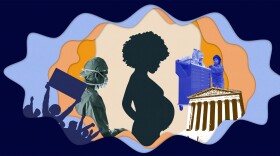-
Older Black and Latino people are significantly more likely to get diagnosed with Alzheimer's Disease than older white people, despite recent medical advancements. Some are trying to close that gap.
-
Artificial intelligence could revolutionize health care. It could also perpetuate and exacerbate generations of racial inequities.
-
The U.S infant mortality rate has steadily declined over the past two decades. But some states are starting to see the reverse trend – with the rate of Black infant deaths far outpacing that of White infants.
-
Abortion restrictions will likely affect Black women the most. Many are concerned about the impact on Black maternal mortality, and the risk of criminalization.
-
Health care providers often rely on digital tools to inform treatment decisions. A growing number of hospitals are moving away from factoring race into kidney disease calculations, after recognizing Black patients could be at a disadvantage.
-
Congress rejected pleas from the White House to pump more money into programs that ensure COVID tests, treatments and vaccines are free for everyone. Public health experts warn the funding cuts will worsen health disparities and hurt those who are already most vulnerable.
-
While cancer death rates in the U.S. have declined in recent years, racial disparities persist. Midwestern states — including Iowa, Illinois, Missouri and Indiana — have some of the highest rates of cancer mortality for Black residents in the country. Public health advocates have worked for years to close the racial gap, but some worry the pandemic will delay progress.
-
New research finds a strong association between a rare genetic mutation and early-onset heart failure and hospitalization among Black Americans. Patients of African descent carrying this genetic mutation developed heart failure four years earlier than those not carrying it.
-
Tarkington Park has been the go-to destination for the Black community in Indianapolis for years, but the neighborhood where the park is located is at the intersection of stark racial, health and socioeconomic disparities.
-
Some Americans are taking on multiple jobs yet still struggling to make ends meet, and that is affecting their health and well-being. Researchers say low-quality, precarious employment is to blame, and it's disproportionately impacting African Americans and other minority populations.

Play Live Radio
Next Up:
0:00
0:00
Available On Air Stations










